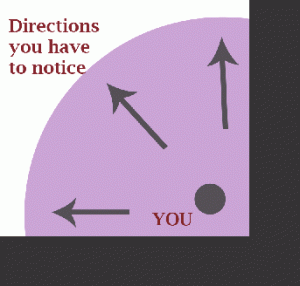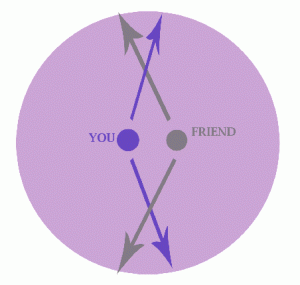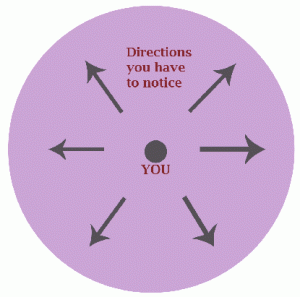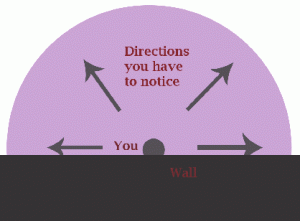As my buddy Caleb Giddings pointed out on his blog a few days ago (and as I’ve said before), it’s impossible to remain 100% alert and aware every waking moment of every day. No matter how hard you try, you simply can’t do it.
We should try anyway, because awareness is important. But because total awareness is totally impossible, we also need to build a contingency plan. That plan should take over any time you know you will focus down on some other task. For example, most of us can’t go through the day without texting a friend. That’s okay and expected. We also know that we literally cannot pay much attention to the world around us while we’re doing it. That’s okay, too — as long as we build certain habits into our “not paying attention” time. These habits can help shield us from danger.
Start smart. Before you focus down, look around. For example, in a restaurant, before you begin an intense conversation with a friend that you know will change your focus, take a walk to the back of the room. “Looking for the ladies’ room” works really well as an excuse for finding out where the exits are and who else is in the building with you. After this walk-through, the only area you’ll really need to keep an eye on is the front door. You can now (mostly) relax about other directions, which will make it easier to focus on your friend’s needs without sacrificing your own safety.
Respect the fringes. Never deliberately allow yourself a change of focus in a fringe area. What’s a fringe area? It’s a place on the way to another place — in between a crowd and a deserted place. Examples include parking lots, the long hallway at the back of the mall, the unpopulated area behind the rides at the fairgrounds, or a quiet back room at a noisy house party. These areas tempt us when we’re looking for privacy to make that quick phone call, but it’s not a good idea. Fringe areas attract criminals, because fringes promise a steady supply of potential victims but also a degree of privacy.
Secure your belongings. Of course, it’s ideal if you can store your “I’m not paying attention” self safely behind a locked door. But if you can’t do that, you can at least put your belongings where you can more easily protect them before you lose focus. Don’t allow yourself to zone out with your purse out of arm’s reach, for example, or shove your iPod across the table to make room for the meal when you’re eating alone. Instead, keep your belongings close to you, where someone would have to physically disturb you in order to snatch them.
Change the angles. If possible, put a wall behind you. Better still, move into a corner. There’s two reasons for this. First, having that wall in the way makes it a little harder for a maybe-a-bad-guy to approach you with plausible deniability, the way he can when you’re standing in the open (hey, maybe he was just walking past…) The second reason is a visual.

Stepping into a corner allows you to more safely focus down, with only a small area of concern to watch.
Overlook your friends. Speaking of angles, try this one on for size: set a new social rule with your friends, one that says, “It’s totally okay with me if you look over my shoulder sometimes. In fact, I want you to!” Here’s why (it’s another visual):

When you have a trusted friend, you can watch each other’s back — cutting your 360-degree awareness problem in half.
Look out! Sometimes it feels like you just have to walk and text. Maybe you and your friends are going to meet up with someone else, and you’re the designated message-sender. Or the group navigator. Whatever. You know perfectly well you’re going to keep your feet moving with the crowd, not demand everyone stop and humor you. What to do? Tell them this story: You totally know this woman who actually walked into a post when she was trying to read while walking! (Yeah, that’s me. In my defense, I was six years old, but they don’t have to know that.) So here’s what you want your friends to do: you want them to promise you, really promise you, that they won’t let you get surprised by anything while you’re paying attention to your phone. They’ll spot the other people and warn you those people are there. They’ll tell you when the group approaches a curb, or a light post, or a pothole, or whatever. Because it would be really embarrassing to fall into a manhole in the middle of the street just because you didn’t notice it.
Watch the time so you don’t get buried. Inside every activity – whether it’s texting, adding up the restaurant bill, reading a book, whatever – some attention breaks naturally happen. Use those breaks to catch up with the outside world. When you text, waiting for your friend to respond is a good time to look around. When adding up a bill or counting your change, instead of staring at your palm, you can look around with a thoughtful air while you’re adding the numbers. When reading a book, it’s natural to take a mental breather at chapter and division headings, but you can also look around between short scenes. Savor your reading! Don’t rush through it with hyperfocused lack of awareness.
Use your kids. Children very naturally notice the world around them, and will comment (a lot!) on what they see if you let them. Encourage that tendency. Not only can it help you during the immediate moment, but it’s also a good habit for them to keep for life. With you cheering them on, they won’t have to relearn the art of awareness as adults. Meanwhile, try playing games such as “I Spy” with your kids, which will help you remind yourself that you need to look around.
Notice the good people. Life feels more pleasant when we look for the good things, and it’s a joy to see what others are up to. Not only this, but sometimes the first indication of trouble is the reaction of good people to the bad guy you couldn’t or didn’t see. So don’t get in the habit of glancing past people you’ve mentally flagged as “not a problem.” Pay attention to their body language, and if they look tense or upset, try to figure out why.
Listen up! In public places, you can hear a constant hum of human activity: the low buzz of people visiting with each other, the background music in the office or elevator, the sound of moving feet along the sidewalk. Make a habit of really hearing this noise as often as you can. This sets up a subconscious radar that will ping whenever there’s a change in atmosphere, intensity, or volume – prompting you to turn your focus outward and find out what’s going on.
Know when to relax. We’ve all met ‘that guy.’ The one who can’t seem to let it go no matter where he is or what he’s doing. The one who expects trouble behind every blade of grass and who can’t ever dial his tension level back. He’s on the fast track to a heart attack, and you’re a nervous wreck hanging out with him. Don’t be That Guy! Once you have set your outer boundaries in place, whatever they are, take a deep calming breath and relax. Life is good.
***
Edited to add: Hat tip to A Girl and Her Gun for the pointer to Caleb’s article. I’d have seen it eventually, but she pointed the way first!







Pingback:Weekend Thoughts « Maspik Teruzim
Pingback:Life In The Fringe - Misfires And Light Strikes
Pingback:Personal Security Tips | In Jennifer's Head
Pingback:How To Detect A Threat While on Foot? | Autrey's Armory
Pingback:What Has She Got in Her Pocketses? | Cornered Cat